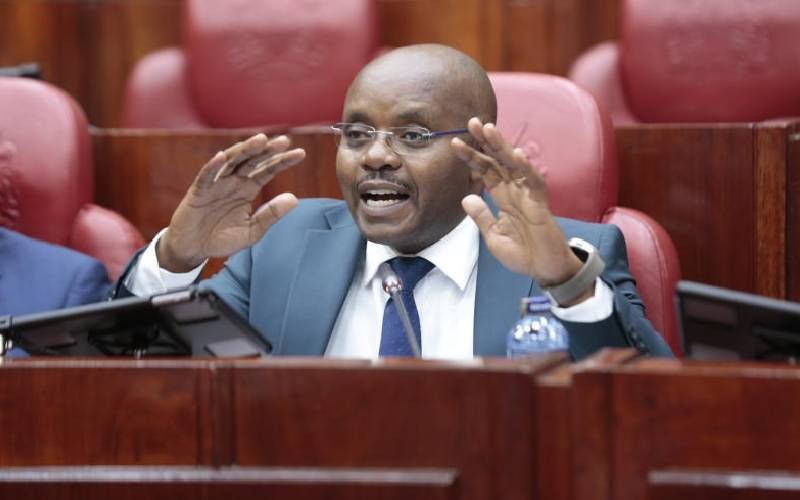Last week’s decision by the Court of Appeal rejecting the stay of execution of the High Court judgement declaring payment of additional allowances to Members of Parliament was a major win for the Constitution.
In December 2020, the High Court had found that the award of Sh250,000 per MP without approval of the Salaries and Remuneration Commission was illegal and unconstitutional.
The judgement followed a protracted struggle between the SRC and the Parliamentary Service Commission (PSC) on their respective mandates.
As far as the PSC (chaired by the Speaker and comprises of MPs representatives) was concerned, it was their mandate to take care of the welfare of MPs.
Such “taking care” role included granting MPs such allowances as would enable them to effectively perform their functions.
The SRC however was clear that when it came to “remuneration and benefits” of MPs, which would naturally include allowances, the constitutional mandate had been given to SRC.
The question of salaries and benefits for MPs has a long history.
Before the promulgation of the 2010 Constitution, Parliament, in exercise of its fiscal allocative powers, routinely adjusted the salaries and benefits of MPs. The matter caused such serious anger among the public that the Constitution addresses it at two levels.
Firstly, it gives the authority to determine remuneration of all state officers, which includes MPs, to the SRC. Secondly in Article 116, it provides that where an Act of Parliament adjusted MPs salaries upwards, such an Act would only take effect after the ensuing election.
The MPs have been so unhappy with these clauses that they tried several approaches to undo their impact.
Those who recall the tenure of the Sarah Serem-commission will remember the numerous times Parliament attempted to bully the commission into accepting proposals for review of remuneration including by reducing the SRC budget.
When this failed, MPs attempted a constitutional amendment to remove themselves from being included in the definition of state officers. That way, they would no longer be under the jurisdiction of SRC.
The defunct Commission for Implementing the Constitution, in which I had the privilege to serve, went to court and the process was stopped.
The final attempt was the one which is the subject of ongoing litigation; the use of PSC as the approver of adjusted remuneration. That too had come a cropper.
As matters stand now, MPs are required to refund an aggregate amount of Sh2.7 billion to the Treasury and appropriate orders were issued to their payroll manager to ensure appropriate deductions or face the court’s contempt orders.
Stay informed. Subscribe to our newsletter
No doubt this is not the last we will have heard of this matter, but while we watch Waheshmiwa’s next move, this moment demands a celebration and thumbs up to SRC and their legal team led by energetic young lawyer Peter Wanyama.
It is sad that after the initial lot of vibrant commissions, the post 2015 commissions have become a moribund extension of the Executive and the political establishment.
They are a pale shadow of the “defenders of the constitution and the rule of law” that was imagined by the Constitution.
But SRC has made its mark, and we pray they will not relent, not just against Parliament but also against an increasingly unruly Executive. That is not to say MPs do not deserve a salary raise. Like Oliver Twist, we all want some more.
All the people ask is that like the rest of us, they abide by the Constitution and follow correct channels.
Surely if Parliament, the lawmakers, will not abide by basic law, who do they expect to abide by the laws they pass every other day?
 The Standard Group Plc is a
multi-media organization with investments in media platforms spanning newspaper
print operations, television, radio broadcasting, digital and online services. The
Standard Group is recognized as a leading multi-media house in Kenya with a key
influence in matters of national and international interest.
The Standard Group Plc is a
multi-media organization with investments in media platforms spanning newspaper
print operations, television, radio broadcasting, digital and online services. The
Standard Group is recognized as a leading multi-media house in Kenya with a key
influence in matters of national and international interest.
 The Standard Group Plc is a
multi-media organization with investments in media platforms spanning newspaper
print operations, television, radio broadcasting, digital and online services. The
Standard Group is recognized as a leading multi-media house in Kenya with a key
influence in matters of national and international interest.
The Standard Group Plc is a
multi-media organization with investments in media platforms spanning newspaper
print operations, television, radio broadcasting, digital and online services. The
Standard Group is recognized as a leading multi-media house in Kenya with a key
influence in matters of national and international interest.







